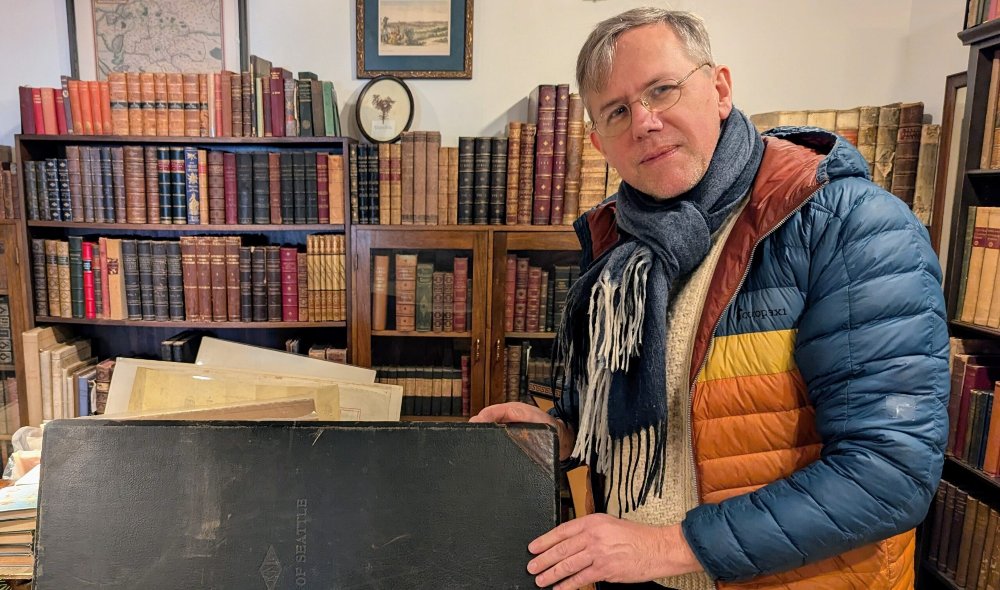Evan Friss’ recently released book, The Bookshop: A History of the American Bookstore, provides authoritative and engaging details about the challenging world of book selling. He chronicles key historical figures from colonial printer Benjamin Franklin to contemporary author and “patron saint of independent bookstores,” Anne Patchett.
“Nineteenth-century booksellers worried that public libraries would destroy them. In the twentieth century, the boogeyman was the radio, then the movies, then TV, then mass-market paperbacks and then the superstores. In the twenty-first century, ebooks and Amazon have been the existential threats.”
Prior to the middle of last century, chain bookstores were rare. Some department stores, notably Marshall Field & Company of Chicago, created massive book departments. But in 1958, small independent bookstores sold about 72 percent of all books; by the early 2000s, that number had dropped to 12 percent. In 1997, chain stores had cornered the market, with Barnes & Noble and Borders selling 43.3 percent of all books.
The battle between independents and chains recently shifted into a war between in-person bookstores and Amazon, which began operations in Seattle in 1995. Between 1995 and 2000, 43 percent of independent bookstores went out of business and many chains closed most or all their stores. By 2019, Amazon sold more than half of all books in the United States. Company founder Jeff Bezos claimed that “Amazon isn’t happening to the book business. The future is happening to the book business.”
The pandemic lockdowns of 2021 may have altered that future. When businesses reopened, a segment of the population turned to independent bookstores as, quoting the book, “an overt political act, signaling a set of values: supporting communities, small businesses, and maybe even the cultures of reading and democracy.” The pandemic also furthered a tradition of book collecting as a form of conspicuous consumption. People sought books to create interesting video backgrounds (“shelfies”) for remote meetings.
In January of 2024, IBIS business analysts predicted continued sales growth of 3 percent annually for independent bookstores and almost 5 percent in the used books category over the next five years. The resurgence of book clubs, the rise in demand for personalization and unique experiences, and improving economic conditions are expected to drive growth.
Friss suggests that independent bookstores have been bruised but not broken. They are “too valuable, too admired, too beloved to be knocked out. Yes, some badly run bookstores went out of business, but plenty are doing fine — better than fine actually. Plus, everyone hates Amazon, whose monstrous dominance induced an even greater demand for in-person bookselling and for small, vibrant business in general.”
An example of these trends is Ballard Books, which opened at 5416 20th Ave. N.W. on December 10, 2023. Proprietor Nils Dickmann said the pandemic was not a driving factor in his decision to open an independent used bookstore, but he does believe the pandemic reminded people that “books really can provide comfort in isolation.”
Dickmann brokered high-end hardwood products for more than a dozen years before deciding to turn his passion for books — particularly old books — into a business. He began collecting books at age 10 and frequented Seattle bookstores most of his life. After the shop in Ballard that had housed John Michael Lang Fine Books closed its doors, he decided to reopen it as a place for “people to browse amazing titles and be reminded of how big this world is.”
Retiring baby boomers who are downsizing and liquidating book collections present a business opportunity and a challenge. Dickmann said: “I have many people come to the store bringing bags and boxes and crates and backpacks of books that they don’t have shelf space for anymore. They hope I’m the solution to their problem.”
Dickmann’s shop is small, so he can only accept a few of the books on offer. Among his favorite books that sellers have brought to his store are an obscure British 18th century bartending book, a 17th century history of England, and a plat book for the city of Seattle that was printed sometime between the opening of the Ballard locks in 1911 and the completion of the Aurora Bridge in 1932.
The bright front room of Ballard Books draws in readers with modern titles, accessible pricing, and a broad range of topics. Through a set of French doors, shoppers can step to the back of the shop to peruse rare, out-of-print, expensive books that are sometimes centuries old.
A young woman of Ethiopian descent walked into the shop hoping to find books on Africa. Dickmann had nothing for her in the front of the shop. In the back, he shared a book about Ethiopia that included old maps and arcane historical details printed on beautiful paper and bound in durable leather. Initially the young woman balked at the price, but she kept viewing, smelling, and touching the text until they negotiated a deal.
Price isn’t the only thing Dickmann considers when selling a book. He is in the business of making a living. But he also is in the business of generating excitement about reading and books. He participates in Ballard Art Walk events, hosts authors, musicians, and artists, and collaborates with other Ballard merchants.
Dickmann does not consider the two other independent bookstores in Ballard, Twice Sold Tales and Secret Garden, to be competitors. Rather, he sees all three stores working in different spheres to build symbiosis around literacy and reading.
Amazon also operates in a different sphere. Dickmann respects Amazon’s use of data and algorithms for helping readers customize their reading experience. He personally prefers the serendipity of browsing shelves and the power of personalized service. “We have a unique identity. I am trying to build a community. Amazon is not.”
Discover more from Post Alley
Subscribe to get the latest posts sent to your email.
